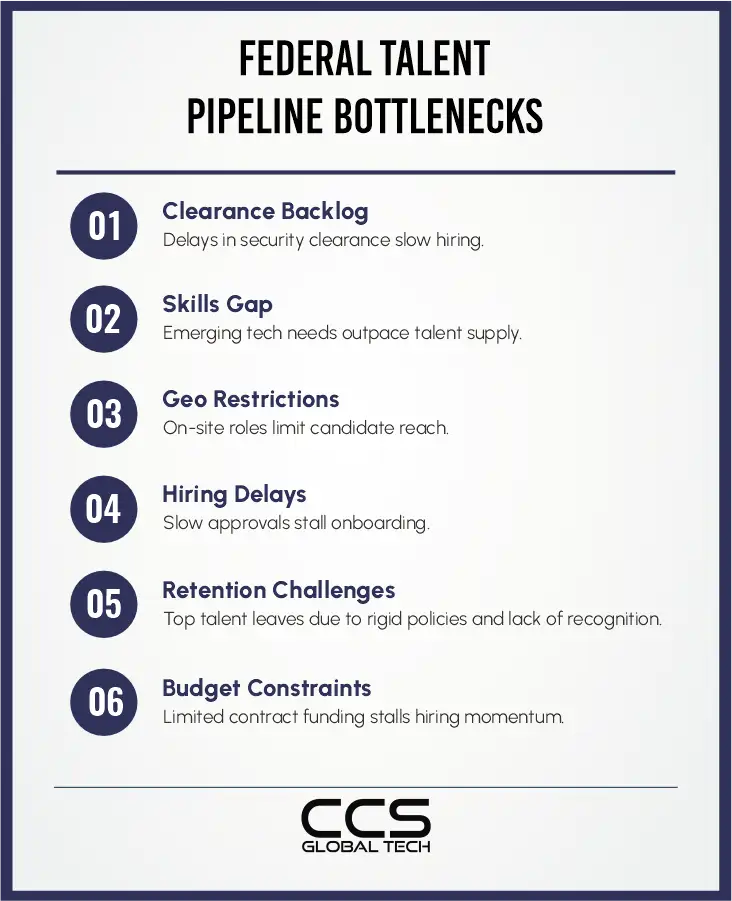Let’s be honest, when most people think about U.S. government contractors in the federal staffing industry, their minds jump straight to the big names. The multi-billion-dollar players. The industry giants. The ones with fancy booths at conferences, multi-year contracts, and full-page ads in defense magazines.
But here’s what they don’t always tell you: When it comes to competing for top talent, size isn’t everything.
Small contractors are winning. Quietly. Steadily. Smartly.
Smaller government contractors are quietly outpacing their larger competitors not because they’re bigger, but because they’re bolder, faster, more human, and increasingly supported by smart partnerships.
This shift is quietly rewriting the rules of federal hiring.
Why are smaller contractors important in the federal staffing landscape?
The U.S. federal government is the largest employer in the country and has an extensive network of contractors supporting defense, cybersecurity, healthcare, logistics, research, and more.
The demand for cleared professionals, cybersecurity specialists, IT engineers, program managers, and policy consultants has skyrocketed, especially in areas like artificial Intelligence and machine learning, zero-trust cybersecurity, cloud computing and infrastructure modernization, health IT and public safety, space and defense technology.
But here’s the catch: the federal talent pool is tightening.
- Security clearance backlogs delay hiring timelines.
- Evolving skill requirements outpace traditional training.
- Geographic restrictions on cleared roles limit access.
Big contractors may have the brand advantage, but they’re not immune to these hiring challenges. And this is where small contractors are finding their edge.
While large contractors bring scale, brand recognition, and institutional partnerships, small contractors bring speed, flexibility, and authenticity, qualities that top talent increasingly prioritizes.
Here’s what sets them apart:
1. Speed over size.
Hiring is a race, especially in high-clearance roles.
A qualified candidate enters the pipeline. How quickly can you respond?
Big firms often suffer from rigid approval processes, internal silos, and risk-averse legal teams. A single hire might take 4–8 weeks to finalize.
By contrast, small contractors can move within days, scheduling interviews, making decisions, and onboarding talent, while the larger firms are still aligning calendars.
Speed alone can be the reason a talented cybersecurity engineer chooses one firm over another.
2. Retention: Where small contractors truly win
Hiring is only half the game. Keeping your top talent is where small firms can truly outshine their larger competitors.
Why?
- Faster learning curves: Less red tape means employees wear multiple hats and gain broader experience.
- Recognition and visibility: Contributions don’t get lost in corporate layers. Wins are shared, celebrated, and visible.
- Flexibility by design: Remote and hybrid options, flexible work hours, and task-based autonomy make small firms more adaptable to life’s demands.
- Innovation-ready culture: Without legacy baggage, small contractors can move fast, try new solutions, and embrace tech transformations.
Real-world impact: Small team, big win
Let’s say a small contractor is competing for a cloud security engineer with federal clearance. A large firm is also pursuing the candidate.
The small firm moves fast:
- Communicates the mission.
- Promises direct reporting to leadership.
- Offers flexibility within federal work guidelines.
- Completes background and onboarding paperwork within a week.
The larger firm? Still waiting for approvals.
Result? The candidate accepts the small contractor’s offer. The project begins on schedule. The contractor earns performance-based extensions.

Add Your Heading Text Here
If you’re a small contractor looking to scale your federal talent capabilities, here’s your roadmap:
1. Define your candidate profile
Do you need active clearances? Veteran backgrounds? Niche skills like DevSecOps or zero-trust compliance?
2. Sell the mission, not just the job
Frame roles around impact: “You’ll help secure DoD cloud environments,” not “You’ll manage back-end infrastructure.”
3. Streamline your internal hiring process
Use automated tools for background checks, clearance tracking, and onboarding workflows. Partner with staffing experts to reduce admin load.
4. Build prime-sub and set-aside partnerships
Don’t go it alone. Partner with large primes or other small firms to gain contract vehicle access and team experience.
5.Track outcomes and optimize
Use hiring and retention analytics. Ask: Where do hires drop off? What keeps your best people? Refine accordingly.
Federal hiring challenges that don’t discriminate by size
Of course, hiring in the federal ecosystem comes with unique hurdles for everyone, big or small.
Some of the most common include:
- Security clearance logistics (background investigations, adjudications).
- Compliance with FAR and DFARS regulations.
- DEI reporting and veteran inclusion.
- Navigating contract vehicles and set-asides.
- Adhering to agency-specific onboarding procedures.
- Meeting tight timelines for staffing surge needs.
This is where partnering with a federal staffing expert becomes a game-changer.

CCS Global Tech: Your edge in the federal talent race
At CCS Global Tech, we specialize in solving the pain points that slow small contractors down.
We’re an embedded staffing partner who understands the nuances of federal hiring.
Here’s what we bring to the table:
- Pre-vetted talent pools: Our cleared candidates are screened for mission fit, culture, and skill before they hit your inbox.
- Veteran hiring expertise: We maintain exclusive access to transitioning service members and veterans who bring discipline, security awareness, and loyalty.
- Background, reference, and clearance verification: From Tier 1 checks to full adjudication support, we take the guesswork out of compliance.
- Speed and compliance: Our federal hiring team understands onboarding constraints and adapts to agency-specific workflows.
- Support beyond the hire: We monitor retention metrics and support redeployments to maximize continuity and contract delivery.
With CSS Global Tech by your side, you compete not as a small contractor but as a smart contractor.
Final word: The underdog advantage
Federal staffing is not just about who has the biggest brand or deepest pockets.
It’s about who moves fastest, acts with humanity, builds purpose-driven cultures, and understands the systems and knows how to work them smartly.
Small contractors may lack scale, but they possess clarity, culture, and courage.
And when they partner with the right support systems like us, they become not just contenders, but pioneers.
So ask yourself:
Do you want to be just another vendor, or do you want to be the agile, mission-driven firm that outsmarts, outpaces, and outlasts?
FAQ
Q1 - How do small federal contractors compete with larger firms in hiring top talent?
A – Small contractors succeed by offering faster hiring timelines, direct access to leadership, flexible work environments, and meaningful roles-benefits that often outweigh the prestige of large firms in the eyes of top candidates.
Q2 - Why is speed so critical in federal hiring for small contractors?
A: In high-clearance roles, hiring quickly can be the deciding factor. Small firms can often move candidates through interviews, decisions, and onboarding in days—while large firms may take weeks due to internal processes.
Q3 - What qualities do top cleared candidates look for that small contractors can offer?
A: Cleared professionals value flexibility, recognition, purpose-driven work, and a clear path to impact. Small firms can deliver on these better than larger bureaucratic organizations.
Q4 - How can small contractors overcome security clearance and compliance challenges?
A: By partnering with experienced federal staffing firms, small contractors gain access to pre-cleared talent, adjudication support, and streamlined onboarding that meets agency requirements.
Q5 - What’s the retention advantage for small firms in the federal space?
A: Employees in small firms often experience faster growth, closer team dynamics, and higher visibility—key factors in boosting engagement and reducing turnover.
Q6 - Are partnerships important for small contractors competing for federal talent?
A: Yes. Strategic partnerships with staffing experts, large primes, or complementary small businesses can expand access to talent pools, contract vehicles, and compliance tools—leveling the playing field.
Q7 - What hiring trends are favoring small contractors in 2025?
A: The shift toward agile hiring, demand for cleared talent, hybrid work models, and mission-focused recruitment are all trends giving small, nimble contractors a strong competitive edge.
Q8 - How do small contractors attract talent without big-brand recognition?
A: Small contractors focus on authenticity, mission alignment, and personalized candidate experiences. By highlighting impact, agility, and direct leadership access, they appeal to professionals seeking more than just a logo.
Q9 - What role does culture play in helping small contractors retain talent?
A: A close-knit, collaborative culture allows employees to feel seen, heard, and valued. This kind of environment fosters loyalty, drives performance, and reduces turnover compared to impersonal corporate structures.
Q10 - How can small contractors turn hiring into a competitive advantage?
A: By streamlining processes, embracing tech-driven onboarding, and reducing red tape, small contractors can act fast, often securing top candidates before larger firms finish internal approvals.






